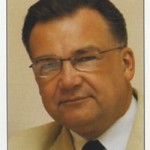PRESS REVIEW
Come back
“One fourth of European clerics study in Catholic seminaries in Poland. They are the children of their times: they know foreign languages, grew up in the world of television, hip-hop and computers. więcej...
In recent months acceptance of the EU in Poland grew to as much as 60 percent, the percentage recorded during the referendum, while a mere 20 percent negatively evaluated our membership in the Union.
JANUSZ ROLICKI
The first EU elections to the so-called new Europe are already behind us. They were accompanied by surprisingly low election turnout. Poland is unfortunately second on the list of the most “lazy” EU countries. Turnout on the Vistula was a mere 21 percent – a low showing even by Polish standards. For years, as a rule, turnout in parliamentary elections in Poland was more or less 45 percent and 50 percent in presidential elections. Given our current negative record and if not for Slovakia, where as few as 17 percent of potential voters took part, we would be the unquestioned leader in this less than praiseworthy ranking.
It is therefore time to answer the question: what is the cause of society’s passive approach to elections and is it an expression of disapproval for Polish membership in the EU? To be honest, I would rather lay the blame for this poor turnout at the feet of Polish politics and not Polish expectations concerning the EU. The past three years, in which governments led by the Democratic Left Alliance (SLD) have ruled the state, have been a time of great disappointment with the moral standard of Polish politics. As much as politics by nature, as we like to claim, is amoral, wide scale scandals and disappointment with the ruling style of former Prime Minister Leszek Miller’s team has surpassed even our worst expectations. To a great extent this is true thanks to the former prime minister himself. Before the elections he promised literally everything and later was unable to keep even the most ordinary promises. Hence society has turned its back on the ruling party and politics in general. The expression of that frustration is low voter turnout.
On the other hand, in recent months acceptance of the EU in Poland grew to as much as 60 percent, the percentage recorded during the referendum, while a mere 20 percent negatively evaluated our membership in the Union. When that, rather relevant, correction is taken into account, the hypothesis concerning a manifestation of anti-EU sentiment on the part of Polish society expressed through low voter turnout does not stand up to closer examination.
Admittedly, Poles have reasons to be dissatisfied with their quality of life. Unemployment in Poland is over 20 percent and belongs to the highest in Europe. For a society, which did not know this phenomenon during the years of communist rule, this is a hard pill to swallow. In all actuality Polish unemployment, which is higher than in neighboring countries, proves that the systemic transformation in Poland was not without its faults. Although Poland was one of the economic tigers of Eastern Europe and noted gross per capita growth of 7 percent during the second half of the 1990s, the other side of that unquestionable growth was the close of many former workplaces. If Poland had a rich uncle, like the German Democratic Republic (GDR) had in the Federal Republic of Germany (FRG), Warsaw’s situation would be different. Let us remember that the systemic transformation in Eastern Germany was one of the biggest economic mistakes in post-war Europe. Although both the Kohl and Schröder governments poured over one trillion marks into the former East Germany during the 1990s, the former communist state was abandoned by 3 million of its residents and unemployment on the Spree is the highest in Germany at 20 percent, pulling down the national average.
From Poland’s perspective, however, it is hard to find comfort in these figures. The fact that the Germans were unable to find the key to economic problems in post-communist territories is no excuse for government leaders in Warsaw. It is also characteristic that the Miller government, generally recognized as the worst in the history of the Third Polish Republic, achieved true economic success last year by pulling the country out of a recession and raising the growth of national income from 0.6 percent per capita in 2001 to 6.9 percent in the first quarter of this year. Because these increases have not brought about an improvement in the domestic economic situation to date, progress in the eyes of the average Kowalski (the most popular surname in Poland, belonging to 150,000 people) has a strictly statistical character.
For that reason it is not hard to understand why research on social moods in Poland, of a comparative nature, were so shocking for the political elite. One of the many centers for public opinion research, at the request of Poland’s largest daily, Gazeta Wyborcza, and the private television station TVN as well as a private radio station, asked respondents to identify which of Poland’s post-war politicians had best served the country. To universal surprise first place on the list, with votes from 46 percent of those surveyed, was occupied by none other but Edward Gierek – first secretary of the Polish United Workers’ Party in the 1970s. Leader of anti-Gierek strikes and founder of the legendary trade union Solidarity as well as first president of the Third Polish Republic, Lech Wałęsa, came in second with 39 percent of the vote. Seventy-five percent of those surveyed, in turn, indicated that the 1970s were Poland’s best post-war period – as well as the safest. In other words the survey, conducted 15 years after the recovery of independence in 1989 and establishment of the Third Republic, failed more than miserably. So far the results have not caused a nation-wide discussion. The entire affair has turned the ruling political establishment into a running joke, and publicists talk eagerly about PRL lines and poverty. While true, this has confirmed yet again that for the average joe, the most important value is securing the necessities of life. However, in a situation in which the market economy offers no easy answers, a deep-seated bitterness towards the world, politicians and fate emerges.
All in all the challenges facing the new government are enormous. The fundamental issue is knowledgeable exploitation of the new economic situation in which Poland has found itself. Until now businessmen have skillfully taken advantage of the lack of union borders and limits. As a result, Polish export is growing in leaps and bounds, and must be followed by a general improvement in the country and for the citizen. The economy is now strong enough to handle political whirlwinds. On the other hand, national and local politicians will have an important voice in deciding how to use Union funds in the coming years. To a large extent it will depend on them whether Poland follows in the footsteps of Ireland or Greece. One thing is certain, if our country uses this historic chance wisely, a chance provided by accession to the richest club of states which is the European Union, then Poland will be transformed.
If everything goes well, as I hope it does, then attitudes in our country will change and future research on the state of our consciousness will be just the opposite of those which I mentioned earlier. Our society and country has survived even more devastating whirlwinds intact. I see no reason why it should be any different now.
Janusz Rolicki













MAZOWSZE GOVERNMENT
Big needs
Our region has practically been in Europe for a long time. The cooperation with European regions started in 1999, just after the administrative reform in the country - says Adam Struzik. więcej...